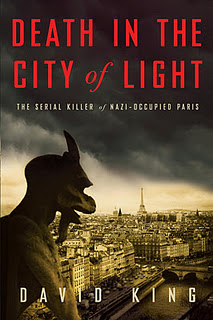This article appears on page 7 of the October 13, 2011[amazon asin=0307452891&template=iframe image] print edition of Ace.
Serial Killer
Lexington author’s new book takes on true crime and history in Nazi-occupied France
By Kakie Urch
David King was perusing a spy memoir from World War II that he had picked up — as part of his antiquarian book habit — at the Friends of the Lexington Public Library store.
That’s where the Lexingtonian, a European history specialist and author, first saw mention of Dr. Marcel Petiot, serial killer.
Dr. Petiot, whose home at 21 rue La Sueur in Nazi-occupied Paris spewed a foul smoke that turned out to be the stench of burning human corpses chopped up and stuffed in a stove. Dr. Petiot, whose premises also contained a 10-foot pit filled with quicklime and as many as 46 decomposed bodies.
Dr. Petiot, who claimed he was working for the French Resistance as he told persecuted Jews to pack all their valuables into suitcases and report to 21 rue La Sueur for safe passage to South America. Dr. Petiot who eluded Paris police for seven months, spending time impersonating an Army officer investigating himself.
Dr. Petiot, who at the carnivalesque trial, surrounded by the evidentiary suitcases of the dead, displayed a brilliance and a madness that confounded the justice process and who, in a quintessentially French moment, screamed at the bailiff, “I forbid you to use ‘tu’ with me!”
Dr. Petiot, the former provincial mayor and respected doctor, who, though no one could ever prove exactly how he killed his victims, was convicted of 26 murders and sent to the guillotine.
King’s new book, Death in the City of Light: The Serial Killer of Nazi-Occupied Paris, is a thrilling masterwork of archival research, popular history and true crime. It was reviewed by the New York Times Book Review today, and TheDailyBeast.com selected it as a “must read.” It is not difficult to imagine a film version with the lead role played by Kentuckian and part-time Frenchman Johnny Depp confounding, delighting and terrifying movie audiences with a subtle, layered, wild-eyed and intense Dr. Petiot. Over the shoulder, one can see Helena Bonham-Carter playing the French author Colette, who covers the circus-like trial for French newspapers.
King got access to a classified police archive of investigation interviews, evidence reports and forensics that had been sealed for six decades. Working in Paris and with materials written solely in French and German, he approached what he describes as “seven giant cartons” of classified records, after working through the unclassified archive of the intense newspaper coverage. It was perhaps his diligence in the early work that helped persuade a top French archivist to grant him access to the classified materials.
“I would have to go to the bathroom at some point, but I literally would not leave my seat. I couldn’t photograph anything. I type very fast. I went through lots of pens — they would run out. I created notebooks of the entire file, handcopied,” King said, in a recent Lexington interview.
The reports were typed, double-sided on the thin carbon-paper of the era. And, as he progressed through the original police and courtroom documents, he says, “As I understood it from newspapers…a lot of things were wrong.” And so, armed with the coverage, facts, confusions, contradictions, inventories and interrogations classified for decades, King revised his already nearly complete manuscript.
This is where his dual skills as a historian and a storyteller come in. Although using the archival materials and providing clear end notes for each source, King tells the story of Petiot clearly and progressively, while showing the reader how truly conflicted the case and its evidence process were.
Police had to sort through the jumbled, quicklime-decayed remains of as many as 47 people, and could put together, from matching belongings in the suitcases to missing persons accounts, a possible victim list of only 27 people. Witnesses disagreed about Dr. Petiot’s character – was he kindly or demonic?
A small triangular room constructed in the center of the house with hooks on the walls, a viewing eyepiece and a false door painted gold seemed to be the kill site. But the bodies did not yield any cause of death. Many thought the chamber was used to administer a lethal injection.
“Part of it is the historian in me. I really want to get the details right…as correct as I possibly can. It’s so over the top, I want to make sure that people know I am not making this up. This is not fiction. I also want to tell it in a way of someone who’s writing a good story. If you’re writing a scholarly book, that’s easy: here are five things I want to prove…1.2.3.4.5. But in popular history, you need to save the arguments…that would slow it down in some ways.”
King said, when asked about styles he admires, that some of his favorite historians are David Fromkin, Erik Larson and Nathaniel Philbrick.
When you have the archive, you have the details, but not often the narrative. King’s skill is in providing both, and in doing so from a record that already, through the fear, mistrust, secrecy and uncertainty of the German Occupation in Paris, is self-contradictory. Even Petiot’s madness is uncertain. He is discharged from World War I service with a 100 percent madness disability, but that is later reduced to 50 percent.
And in true crime, authors are often gifted with a straightforward evil for a main character. It is sometimes simpler to progress through a tale of killer who is a one-dimensional monster, and easier too, when forensic evidence is more clearcut. In Death in the City of Light, King rises to a more complex challenge.
“I was trying to understand him. I really hesitated to use the word ‘the killer’ is there any way that this guy could possibly be innocent? What about the suitcases? If he really helped people get to South America, why wasn’t at least one person able to come out and say so. If I were the jury that would be a very difficult case,” King said.
King also, in the book, provides key glimpses into the cultural history of the Parisian gangster underworld and the wartime dynamic that played into Dr. Petiot’s scheme. In providing a cultural view of the time, he lets us know what is going on across the Seine as Pablo Picasso, Jean-Paul Sartre, Simone DeBeauvoir and Albert Camus engage in their intellectual revolution under Occupation.
“I didn’t want to write just somebody going around and killing people. I like the sense of place when I am writing. This was in Paris, if it had been in Berlin, or Lexington or Chicago, it would have been a different story. It was refreshing to for a moment to step away from the killings. I wanted to try to put the context in,” King said.
King lives in suburban Lexington with his wife, Sara King and their daughter, 7, and son, 4. A graduate of Woodford County High School, he did his undergraduate work at the University of Kentucky in the Honors Program and did a master’s at Cambridge University. He did a Fulbright in Sweden, researching what would become his first book Finding Atlantis He later taught large introductory European history lectures and Honors Program seminars at the University of Kentucky.
A Random House editor who had found the likes of Calvin & Hobbes and The Far Side in slush files and signed them, was the person who took the first interest in King’s work in popular history, he said. He’s been a full-time author since the publication of Finding Atlantis, a book born of archival study in Old Swedish of the records of a Scandinavian academic who ruined his career by insisting that Atlantis must exist and trying to prove it. His second book, Vienna 1814, uses the archive to tell the behind-the-scenes story of the international conference held that year in Vienna.
But King is in no way a stuffy academic. As a student at University of Kentucky, he was one of the founders of the student radio station, WRFL-FM and an original WRFL DJ, doing a Britpop show on the station. When he went to Cambridge, he took his Woodford County Babe Ruth baseball skills and his WRFL ballcap onto the cricket pitch.
“I just asked them where to aim,” he said of his first time as bowler, when he said, by sheer beginner’s luck, he scored the elusive “wicket maiden,” the equivalent of a strikeout of the whole team.
Also at Cambridge, he played on the baseball team, which he characterized as the “Bad News Bears,” never winning a single game, despite talent that included former players for Baylor University, the College of Charleston, the captain of the Czech national team, and a professional cricket player. “We almost beat Oxford once….,” he said, trailing off.
King said that he has revised and focused his painstaking archival research process since his student days because he loves to spend time with his children. European history archives tend to be in Europe. “I don’t want to be away for a couple years. I want to be a little more focused,” he said, noting that he has traveled to Europe four times since January and is right now enjoying being home in Lexington, while mulling over ideas for his next project.
The first international edition of *Death in the City of Light* book is scheduled to come out in Britain in January and an Italian version is also planned. So far, however, King said, there are no firm plans to translate the work into French for publication in Dr. Petiot’s home country. However, King said, he has been hearing from the French police, who have just received their English language copies.
“The police loved it. I have gotten some emails from them – they played such a huge role in helping me,” King said.
And in his epilogue to the book, King, again using archival documents and antiquarian publication research, may have helped the police: to determine a shocking twist on just how Dr. Petiot killed his victims.
He used technology unavailable to Massui, the 1940s Paris detective (and prototype for George Simenon’s famous Detective Maigret) who investigated the Petiot case: a Google alert and E-Bay.
It seems possible that the evidence that King has unearthed might warrant a re-opening of the case.
King had searched library databases covering 10,000 libraries internationally, he said, for Albert Massui’s “Le cas du Dr Petiot.” No one held the rare antiquarian memoir. Then one day, a Google Alert came in: It was up for sale on Belgian E-Bay.
Massui’s memoir included an account from a potential victim, who in in 1942, had made it all the way through Dr. Petiot’s “escape process” from Occupied France but had escaped alive from the triangular room, the room specially built for killing.
Putting this survivor’s account of what happened to him in the locked room that slowly “filled with gas” together with the records of the specifications given to the builders of this “radiation chamber” by the doctor, the history of the development of execution methods, and accounts in “The French Gestapo,” King finds that it is probable that Dr. Petiot was operating his own gas chamber.
Worse yet, this man who was offering escape passage to Jews was using, King postulates, with strong evidence, hydrogen cyanide gas – the generic form of the Zyklon B that was so tragically used at Auschwitz-Birkenau.
David King brings the terrible story of murder in the City of Light to light completely through his careful, dedicated work in the archive and through his storytelling.
Unfortunately, it is all true.
Author David King will be at the Kentucky Book Fair at the Frankfort Convention Center on Saturday, Nov.12. He will also lead a discussion on his book on Monday, Oct. 17 at 7 p.m. at the Jessamine County Library.











